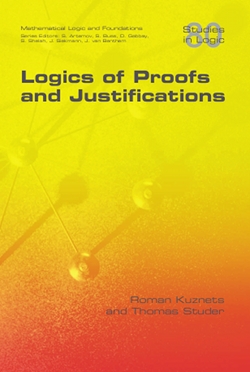 | Logics of Proofs and Justifications
Roman Kuznets and Thomas Studer
Justification logics are closely related to modal logics and can be
viewed as a refinement of the latter with machinery for justification
manipulation. Justifications are represented directly in the language by
terms, which can be interpreted as formal proofs in a deductive system,
evidence for knowledge, winning strategy in a game, etc. This more
expressive language proved beneficial in both proof theory and
epistemology and helped investigate problems ranging from a classical
provability semantics for intuitionistic logic to the logical
omniscience problem.
Justification logic is a new and fast evolving field that offers
unexpected new approaches and insights into old problems. Its position
at the junction of mathematics, philosophy, and computer science makes
it of interest to a wide audience.
This book provides a rigorous introduction to justification logic. It
covers the basic constructions of justification logic as well as
epistemic models and provability semantics. Further it includes chapters
on decidability and complexity of justification logics as well as a
chapter on self-referentiality. It also contains detailed historic
remarks on the subject.
March 2019
978-1-84890-168-1
|

